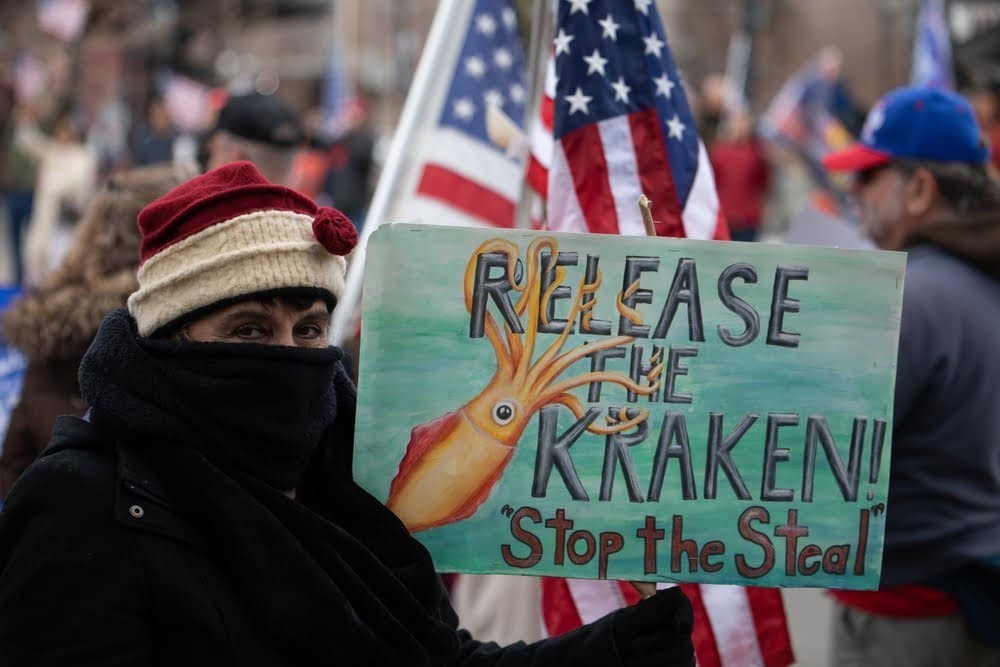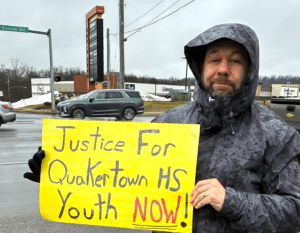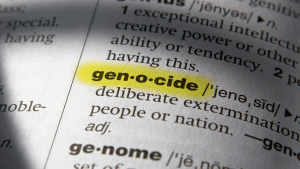Common Cause, a non-profit, non-partisan election integrity organization, provided a briefing for members of the media on Tuesday to talk about emerging threats that could impact the 2024 election.
“We are facing significant challenges,” said Virginia Kase Solomón, Common Cause President and CEO. “We have active voter suppression through bad laws and voter intimidation, election officials who are actually leaving because of the added threats and harassment they’re experiencing, rampant mis- and disinformation spreading through our communities, and the implementation of new voting laws, among many other things that we are dealing with now.”
Identifying and addressing the threats, as well as inoculating the public against the endless stream of misinformation from anti-democratic forces are two top of the list priorities, Kase Solomón said.
November’s presidential election marks the first such political contest since the emergence of 2020 election deniers and serial election fabricators. The ability to sow doubt among the American populace regarding the integrity of one of the nation’s foundational processes presents a significant challenge in its own right.
“They’ve undermined the faith of many Americans in our elections and fed anger and heated rhetoric that changed the face of our democracy,” Kase Solomón said. “Those lies have also led to threats and harassment to election officials who have seen mass turnover in their ranks.”
Threats of violence, doxing and the ongoing harassment of election officials and their families, have already thinned the ranks of experienced election officials, creating inroads for those trying to disrupt our system of democracy.
Reports of elected bureaucrats using lies to pass laws making it harder for Americans to cast a ballot has become too commonplace, along with the explosion of rogue actors manufacturing disinformation using AI to create deepfake content.
“Common Cause focuses our work on threats, harassment, and physical violence related to our elections,” said Suzanne Almeida, Director of State Operations. “While we’re seeing a lot of threats and harassment, a lot of very militarized and violent language, as well as things like doxing, swatting, calling, and bomb threats, it’s important to note that there have been limited instances of physical violence.”
Almeida said these observations are not to minimize the potential for physical violence but, when looking at the whole picture, it’s important to keep in mind that it only takes one bad actor to initiate doxing, swatting or bomb threats.
READ: How 9 Mistakenly Discarded Ballots in Luzerne County Helped Fuel Trump’s 2020 Lies About Elections
“However, we are seeing a normalization of hate, violent rhetoric, violence, threats, and harassment as a viable political strategy,” she said.
A recent Brennan Center survey revealed that almost 38 percent of local elections officials report threats, harassment, and abuse, and 54 percent are concerned with their safety or the safety of their colleagues.
“We know that these threats are disproportionately directed at women and people of color. Obviously, this is unacceptable for a number of reasons, but it is also super problematic because these threats are used by anti-democracy actors as a way to disrupt our elections processes,” she said.
According to Almeida, “given the heightened political climate and the intense rhetoric that we’re really experiencing right now, Common Cause and our allies are looking at ways to ensure that voters have a positive experience however they choose to vote,” she said. “When it comes to violence against voters, it’s important to remember that voter intimidation, threats, harassment, violence is illegal in all 50 states plus D.C.”
“Since 2016, election officials have been working overtime to prepare for cyber threats. State and local election officials work closely with the Department of Homeland Security, the FBI, and local law enforcement,” said Susannah Goodman, Director of Election Security Operations at Common Cause. “Whether the threat is from a nation-state like Russia or Iran or China or from a domestic actor, election officials are preparing.”
Goodman believes that U.S. election officials are prepared. “What we are concerned with and are working to prepare for is the mis- and disinformation that can arise from simple, isolated machine failures, because as we all know, machines can fail when we least want them to.”
Back-up procedures to remedy the malfunction of electronic poll books or ballot scanners at a polling location are key to prevent the creation of rumors that call into question the integrity of the voting process.
“The other thing we’re doing, and what election officials are doing everywhere, is communicating all the checks and balances that are in place to ensure that ballots are counted as cast,” said Goodman.
“The vast majority of voters mark paper ballots, either with ballot marking devices or by hand. Paper ballots can be recounted and audited easily.”
“Our team is working to put out simple messages ahead of this year’s election so that voters understand these very basic things and are ready and will be confident in the results,” she added.
READ: Confronting a ‘Second American Revolution’ on the 4th of July
This election cycle will be the first where AI really rears its ugly head.
“The ease in which you can create convincing images and video and text is unsurpassable for manual fact checkers anymore,” said Ishan Mehta, Media and Democracy Program Director. “The ubiquity of these tools means that you don’t have to be a computer expert anymore to have misinformation that would convince a lot, over half the population.”
“The second aspect is that social media platforms have backed off from enforcing their own content moderation and civic integrity policies,” he added.
The abdication of responsibility, and even bias, by some of the major social media platforms is daunting, not to mention networks that are specifically created to push false narratives, such as Truth Social.
In 2020, and now in 2024, the Common Cause inoculation library – a central online location filled with accurate, reliable information about elections – will be available to counter mis- and disinformation. Volunteers and the general public will have access to the messaging for sharing on social media platforms and other online venues.
In addition to accurate messaging, Common Cause also operates a monitoring program where volunteers specifically look to identify mis- and disinformation, threats or problematic situations before, during and after the election with partners working to get out the vote, or on election day at the polls, to better prepare for potential incidents.
Amy Keith, Executive Director of Common Cause Florida, described a nightmarish situation occurring in the Sunshine State. Following 2022, all vote by mail ballots were canceled to force those who wish to vote by mail to re-request a mail ballot.
As of July 24th, over 1.9 million Floridians who received a mail ballot in 2022 were not yet signed up to receive a 2024 mail ballot which is problematic since the state’s primary will be held on August 20 and early voting has already begun.
“This is the first time that we’re really going to see the full impact of that vote-by-mail reset,” Keith said. “We and our election protection partners across the state, we’ve been working for the past 18 months on this vote-by-mail reset to let voters know that they need to request their vote-by-mail ballots and help them sign up.”
This is but one of a series of problems taking place in Florida that Common Cause is working to solve.
“Back in May, Florida’s Division of Elections sent an email to all supervisors of elections in the state, compelling them to conduct voter roll maintenance using a list of approximately 10,000 voters that was produced by a private citizen affiliated with Eagle AI,” she said.
READ: Pennsylvania County Disenfranchised Voters Whose Mail-in Ballots Had Errors, ACLU Lawsuit Claims
“We have joined with a number of voting rights organizations to strongly oppose this action because we believe it conflicts with both state law and with the National Voter Registration Act,” Keith added.
Philip Hensley-Robin, Executive Director of Common Cause Pennsylvania, said they are preparing for every contingency, and that incidents of violence or intimidation at polling places must be addressed, even if they are isolated.
“Our nonpartisan poll-monitoring program, as part of our broader election protection program, will deploy hundreds of poll-monitors to polling places across the Commonwealth and will this year be provided with de-escalation training,” he said.
Common Cause PA is anticipating some bogus lawsuits and other attempts to undermine public confidence in the election in order to disenfranchise voters.
“There is, unfortunately, this sort of cottage industry out there. This is not dissimilar to what we’re hearing about in Florida with Eagle AI, with out-of-state groups armed to throw doubt and spread misinformation about our elections,” Hensley-Robin said.
“Vote-by-mail policies in Pennsylvania have created issues for some voters because PA law gives substantial discretion to counties in establishing vote-by-mail policies, and some counties have sought to limit the accessibility of mail ballots, while others have taken steps to make sure that voting is more accessible.”
A classic example of this broad discretion is how some counties in the Commonwealth allow vote-by-mail deficiencies to be cured while others don’t.
READ: Wanted: Poll Workers. Must Love Democracy.
Hensley-Robin said that Common Cause is acting in concert with partners as part of statewide litigation that would prevent ballots from being disqualified due to a wrong date on the outer return envelope.
“Common Cause and our allies will continue to fight all of these efforts by those who seek to dictate who can vote and can’t vote in Pennsylvania elections.”






